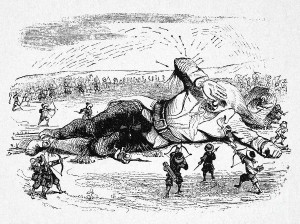When I first went overseas with the volunteer organization Canadian Crossroads International (CCI)—which I wholeheartedly recommend—they put us through a highly questionable selection procedure. There are a few of these organizations that offer what people in the development field call aid tourism. Frequently aid is an excuse to get into the country and proselytize for many of these organizations are religious in orientation. Although I don’t know the percentage, I would guess they are made up more of Christians of various stripes than other faiths. Christians have a mandate, it seems, to ensure that their true god becomes everyone else’s true god, at nearly any price. After the boxing day tsunami such religious aid packages, where food was dangled over the heads of recalcitrant heathens by over-zealous Christian groups, was made illegal in Sri Lanka. The first law of its kind, it was legislative acknowledgement of what we suspected: that starving people to make them worship your god might be religious but is hardly Jesus-like.
More than a few of the non-proselytizing organizations, and there are many, would prefer to send privileged people from the west to enjoy the other country than to put that money to better use in the community. Thus, we have habitat for humanity teaching teenagers from the west how to build houses in a poor country where most people are capable of building their own home. The teenagers have a great trip, they get to bond with other teenagers from their own country, and in the process learn some useful skills. They have also, in their lights, earned bragging rights back home. The houses get built, although the price of shipping our overfed youth would have built more houses.
The organization I went overseas with had more in common with WUSC than the religious groups. CCI began as a group under the auspices of the United Church, but it threw off the spread the word message and instead began to focus on cross cultural understanding. With that in mind, they chose largely middle class university students, although some older people became involved, and shipped them to a set of countries where their skills, if they had any, could be of use. The main purpose was not condescension-flavoured helping, however, for they were more interested in what a young person from Canada might learn about the other culture and their own place in the global environment by observing the situation of others.
Their rationale about sending the overfed on expensive jaunts was slightly more tenable, although perhaps the outcome was the same. At least with CCI we stayed with a host family, learned some of the local language and culture, and mixed with the  community. I went to the Cook Islands, where I was largely responsible for putting together my own placement, but others went to West Africa, South America, and Asia.
community. I went to the Cook Islands, where I was largely responsible for putting together my own placement, but others went to West Africa, South America, and Asia.
The selection procedure that enabled us to join the organisation was flawed by one of the organizers, however. The particular vicissitudes of the set of meetings that led to my selection procedure was due more to the local selection group than the organization in general. In fact, people at the the main organization were disturbed by the questionable practices by the local group and in the following year reviewed some of their practices.
I first heard of CCI through my friends who had gone. Nat had gone to Kenya and Lou to Botswana. They praised the experience and claimed it to be—cheesy as it sounds—life changing. They met amazing people and very much reformed their outlook on their place in the world. I liked this aspect of it, and having little money at the time, was even more attracted by the fact that someone else was paying for my plane ticket and a stipend for living expenses.
I applied, and once I was accepted I was informed that there would be an information session in the region, in which the regional representatives would get to meet all the volunteers and tell them some of how the program worked. Like the others, I was suspicious that the weekend of fun and games, such as icebreakers and other social games, were part of the judging process. The invigilators had chosen exercises in which we were responsible for another person in a blindfold game, and played the part of someone in a developing nation in a feast or famine exercise. They watched how we performed, and although they didn’t overtly take notes, we wondered at the purpose of their attention.
I blindfolded Kelly and led her around the grounds of the retreat on the Nova Scotia coast, encouraging her to put her hands on dead jellyfish and in other ways having fun. In the feast or famine exercise, I was awarded by chance the opportunity to set at the table of the rich, with all the food I wanted, while others sat on the floor and ate with their hands out of one pitifully inadequate bowl of rice. We were to feel how those in developing nations felt, although with the people at my table bragging about how much food they had in front of those on the floor, I was uncomfortable. I had argued that I belonged on the floor when I was chosen to represent rich people, and finally, becoming annoyed at the behaviour of my rich peers, I began to throw cookies to those who requested it from amongst the world’s poor. This was not received well, and I was told I was ruining the exercise. I told them I was an aid truck, arriving in a village and dispensing foreign aid. I was thrown out of the rich table, so, mining it for transportable snacks, I joined my compadres on the floor where I was better appreciated, and I felt, better understood.
Partway through the weekend, Sandy told us that we were no longer being judged. Everyone present was going overseas and we should just enjoy ourselves. Perhaps she thought we were being too wooden, or that she was not getting to the heart of each person’s unfitness, in Sandy’s terms. In any event, people realized more, and that evening, which would be the evening before we left, we were encouraged to take large pieces of paper and draw our life line. We were to make a road map of where we had been, our traumas and history, and our hopes and fears for the future. Each person dutifully got their coloured pencils and set to.
I was suspicious. It sounded like such a great way to get to the heart of something people would be reluctant to say if they felt they were being judged. I drew a picture of a face, and then wrote some of the lines of a poem I was writing that went on to become Multiple Personality Disorder. After, we were encouraged to hold up our timeline and tell the rest about it. Mine revealed little about my personality, except perhaps I was interested in writing and was a terrible sketch artist. Other people talked about abuses they had suffered, their fear of people not liking them, recent breakups, medical issues, and a host of more mundane issues. I watched Sandy, but she gave no sign that any of this concerned her.
My friend had told me that Sandy’s stove had two settings, hot and off. She was the same friend who told me what happened after the weekend. True to this description, the invigilators sat down after all of the prospective travelers went home, and decided whom they would allow to go. Tim told me later that he was uncomfortable with the lying to the volunteers, and that he felt they deserved more respect than that, but Sandy shouted him down and achieved the result she wanted. They sent out letters after that weekend to all who attended, telling them that the weekend was a success and informing them of whether or not they had been found fit or judged to be wanting. Two people from my town were rejected on the grounds that they were not social enough, and apparently, I found out later from others privy to the meeting, Sandy had spoken against me, but could not make a strong enough case to convince the others who did not share her animosity.
This caused some discussion amongst the volunteers, although I was more angry than others. I despise being lied to and I felt it was so unfair to trick this vulnerable group under circumstances in which they felt safe. When our next meeting came about, I watched carefully as Sandy approached a fellow volunteer and asked her to draw a nice card for someone who couldn’t attend. After everyone signed the card, Sandy (not being able to resist showing her consummate skill at manipulation) announced that the artist also had to leave early. Sandy told her fellow invigilator how she had deliberately asked this woman about the card so that she felt included. I overheard this, and it confirmed for me that this was a person for whom manipulation was as natural as breathing and as toxic as mustard gas.
Later, still on the first evening of the second meeting, we were asked to tell the crowd our greatest fears about going overseas. Of course, people were much more circumspect now; they remembered what happened the last time they were asked to divulge and no longer believed the claim that we were no longer being judged. I spoke up finally, about what had been bothering me. I said, “I am concerned that Crossroads has lied to us.” That bomb dropped solidly into the room.
“What do you mean?” an invigilator asked me while Sandy glowered.
“We were told at our last meeting, months ago, that we were no longer being judged, just before an exercise in which we were asked to divulge our greatest hopes and fears.”
The meeting was adjourned rather quickly before the discussion could begin, but a few curious people, ushered along as they were, asked me about it and I told them what I knew. Sandy requested a meeting with me and the other coordinators where she told me I was sabotaging the weekend. I was told not to talk about how they lied and that my friend had no business uncovering the falsehood. She took no responsibility for her actions, and although the others looked uncomfortable with their complicity, she seemed proud of what she’d accomplished.
More than a few others approached me for information, but we knew were powerless in the situation if we wanted to go on the trip. I spoke to Tim privately, since he was an invigilator, and he agreed that it was unethical, and that he had spoken against it at the time, but that it was done and we must move on.
She sent an irate letter to me, cc’d to my friend, as well as head office, in an attempt to discredit me and have me thrown out of the program, but Sandy was known in Toronto. They instead asked what had been happening in the east that so greatly devalued the trust that Crossroads needed to maintain its credibility.
People at head office knew my name when we had our last meeting in Toronto before we left, and I anticipated, even as I guessed we would not be fed breakfast on the final day before our flight, I would be rejected at the last moment. Instead, I was suddenly—if thirty hours of flight could be called sudden—in the Cook Islands, where I tried to find some way to make myself useful in a place of people more competent than me.




